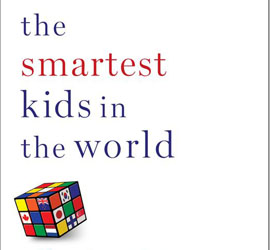In my last post I recommended The Second Machine Age for anyone interested in learning what the economy and jobs of the future are likely to look like.
The second book I want to recommend is about education. As followers of our work know we have come to believe that education is the best lever available for both individuals and communities to prosper in an economy being constantly transformed by globalization and technology. The book is The Smartest Kids in the World by Amanda Ripley. A journalist who writes for Time Magazine and the Atlantic.
Ripley tells the story of countries that do well on the international Program for International Assessment (PISA) test. Maybe the most important of the international tests that America does poorly on. She tells the story by following three US foreign exchange high school students to schools in Finland and South Korea––two countries that rank near the top––and Poland––which is improving rapidly––on the test. Its a wonderful way to make the differences in approach to k-12 education real and accessible for readers.
The book is terrific. Its a must read for anyone who cares about the quality of American/Michigan k-12 education. And particularly for those involved in k-12 education policy and administration. The differences in the quality of education the students experience in their high schools in Oklahoma, Minnesota and Pennsylvania compared to Finland, South Korea and Poland should make all us very, very sad and mad. Quite simply our kids deserve better.
There are lots of lessons to learn about what a good education system looks like, how it is designed and executed. Particularly how you attract and retain good teachers which as we all know is the most important ingredient to a quality education.
But the lesson that comes through the clearest is the degree to which Americans no longer value education compared to the countries Ripley is writing about. Our fundamental problem is not bad policy, but rather it is the widespread belief by too many Americans that our kids and country can do well without a rigorous education.
Ripley writes:
They (students) took school more seriously because it was more serious. And it was more serious because eveyone agreed it should be. There was a consensus in Finland, Korea, and Poland that all children had to learn higher-order thinking in order to thrive in the world. In every case, that agreement was born out of a crisis: economic imperatives that had focused the national mind in a way that good intentions never would. That consensus about rigor had then changed everything.
… In the United States and other countries, we’d put off this reckoning convinced that our kids would always get a second and third chances until well into adulthood. We had the same attitude towards teachers: Anyone and everyone could become a teacher, as long as they showed up for class, followed the rules, and had good intentions. We had the schools we wanted, in a way. Parents did not tend to show up at schools demanding that their kids be assigned more challenging reading or that kindergarteners learn math while they still loved numbers. They did show up to complain about bad grades, however. And they came in droves with video cameras and lawn chairs and full hearts, to watch their children play sports.
That mindset had worked alright for most American kids, historically speaking. Most hadn’t needed a very vigorous education, and they hadn’t gotten it. Wealth had made rigor optional in America. But everything had changed, in an automated global economy, kids needed to be driven; they need to know how to adapt, since they would be doing it all their lives. They needed a culture of rigor.
Exactly! You really owe it to yourself to read this book.







